IN SEARCH OF LEADERSHIP: A REPORT FROM SFIFF 53
This is my first report from the 53rd San Francisco International Film Festival. I’m not sure how many I’ll do, but this won’t be the last.
If I were to write a lede for this piece, it would enthusiastically refer to Walter Murch and to SFIFF more generally, since that’s what I’m here to write about. I would tell you, for instance, that SFIFF is the longest-running film festival in the Americas. That would be a proper introduction. But I’m not a journalist, I’m a filmmaker, and I take everything personally.
Recently there have been some skirmishes among factions in the independent film community—but first we should grant that “independent film community” is a hapless phrase which loses some traction with each passing minute.
Ah, but I now I’ve gone and shown you my bias.
Several years ago Nick Rombes wrote an essay titled Professor DVD. In it he asserted that academic authority over the study of cinema had been rendered impotent in the era of the DVD commentary. The university’s traditional modes and means of gatekeeping knowledge had been undermined. Now students could watch a film with the director alongside to “teach” it.
What fascinates me about situations in which longstanding authority is compromised is that those who relish their new autonomy don’t seem to fathom the amount of responsibility they suddenly have for themselves. It would be cheap and misguided to drop geopolitical analogies here, but squint at this silhouette of a point: human beings require leadership no less than they require food.
As for the tools of film production, they are ours—mine and yours—as much as those DVDs are. Ten years ago we used the valorizing but specious term “democratization” to describe what was merely decentralization—sure, our sense of liberty is intact but it’s time to remove the implicit “huzzah!” which tags along wherever democracy goes.
“When I bought that kinda-fancy-for-my-neighborhood video camera, I realized I was just making films for myself and my friends,” confesses Joe Indie. “But then my friends started making their own films and I was left making films for myself. And I’m okay with that.”
Of course Joe Indie would never say such a thing. Joe Indie is yammering on about some disembodied audience that parsimoniously withholds attention and validation—and, oh yeah, money. Joe is in a panic, wondering whether his audience exists (can Joe in fact exist without an audience?) and fearing that in addition to making his film he must give birth to 10,000 people who will care enough to watch it. Joe has no idea how to do this, so he seeks answers from experts. Joe finds the experts conveniently assembled on one panel. There the experts re-package Joe’s anxiety and sell it back to him.
These panels, somewhat controversial suddenly, have been popping up like megachurches to impose some order and provide some hope (same sensation, different words). They dignify the practice of talking about what we don’t know, banners emblazoned with vast faux-naif queries like “Where Are We Going?” or “What’s Next?” Someone in the “independent film community” has commoditized this not-so-new opiate: talking about it. Talking about what exactly? No one knows. But whatever it is, prognostication is not problem solving. It never has been.
I do what I can. I talk about what I know. I don’t do what I can’t or talk about what I don’t know.
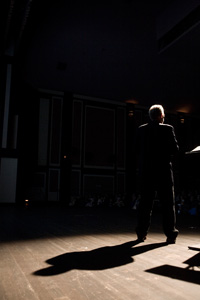 And, for reasons which will become clear, this brings me to Walter Murch.
And, for reasons which will become clear, this brings me to Walter Murch.
Murch appeared at SFIFF 53 on Sunday to give the annual State of Cinema address. He had been scheduled to attend an Ebertfest screening of Apocalypse Now several days before, but volcanic ash had disrupted his travel plans. I felt a spasm of pride over having more exclusive access to him as a result of this misfortune. See, Murch has a mystique which inspires his followers to elbow each other out of the way. He is notoriously reclusive and inaccessible, so his appearances take on a messianic air. I stood in line with press-passers swapping stories about brief encounters with the man. SF360‘s Michael Fox told me of an event at which Murch had handed out fortune cookies containing Bresson aphorisms. The wise leading the wise. How desperately we need the Murches and the Bressons now.
“Have you read his book?” someone asked. Well, then we had to distinguish between the book Murch wrote and those which have been written about him—or, most famously, the one in which Michael Ondaatje, author of The English Patient, simply transcribed a few meaty conversations they’d had. And, yes, Murch is that interesting—an erudite novelist felt compelled to publish an entire book of… conversations. It’s telling that I was scolded by the staff at Pacific Film Archive for recording Murch in Q&A several years ago. His ideas are inimitable, dependent on equally uncommon perspicacity and phraseology. “Poet-philosopher of the cinema” is the not-at-all-hyperbolic label SFIFF director Graham Leggat used to introduce him.
Murch lurched a bit as he began his address. Having seen him speak on several occasions I can attest to the circumstances in which his ideas flourish—that dynamic, vital intelligence is happier when engaged, when given something to respond to, than when the material has been prepared in advance. He is a richly associative thinker, foil to the professor with a set curriculum. A peripatetic thinker in the Greek tradition, he seems to walk toward ideas as if they were clearly marked destinations on a map only he possesses.
Murch treated us to accounts of early cinema hijinks and in the measured way of a stoic historicist demonstrated that century-old technology could be more exciting than the latest breakthrough. He showed a hundred-and-some-year-old clip of film which had been shot with simultaneously recorded sound, the massive conical microphone consuming the left half of the image as Edison’s assistant Dickson thrust his violin toward it. Edison and friends were able to record sound and picture but did not have the means to synchronize—”post-production,” as we call it, was not conceptually or practically available to them. Murch was given this material several years ago with the understanding that he was the most suitable candidate to “fix” it. And when he did, he said, the hair on the back of his neck stood up: “I thought, ‘I’m the first person to hear this in sync, ever’.” When he played the moving image and sound together, applause nearly smothered the faint, scratchy sound of Dickson’s violin.
A feat without precedent—to the extent that finding an analogy is difficult. Could someone have made the upper and sole of a shoe before having the ability to conjoin them? Wouldn’t conceiving them separately require conceiving them as a whole, which would presuppose that they could be fastened together somehow? How could Edison conceive of recording sound and picture simultaneously without a means to link them? One begins to reflect on the nature and substance of invention, of inventiveness. There is a necessary halfness to things, partial realizations. The just-invented artifact bears resemblance to a thought—it has not yet learned how to be a thing in the world.
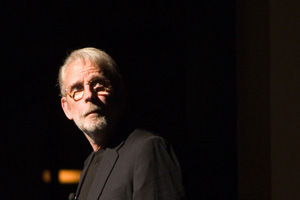 Murch then interrogated the circumstances under which cinema came into being, that confluence of disparate technologies with the indomitable will of inventors and opportunistic entrepreneurs. Edison was “dedicated temperamentally to maximizing profits,” Murch said. He would not abide suggestions that he explore the communal possibilities of cinema because such a development would have limited the number of individual motion-picture viewing stations he could sell. Murch obliquely linked the kinetoscope to the iPad in this regard.
Murch then interrogated the circumstances under which cinema came into being, that confluence of disparate technologies with the indomitable will of inventors and opportunistic entrepreneurs. Edison was “dedicated temperamentally to maximizing profits,” Murch said. He would not abide suggestions that he explore the communal possibilities of cinema because such a development would have limited the number of individual motion-picture viewing stations he could sell. Murch obliquely linked the kinetoscope to the iPad in this regard.
Murch went on to credit Beethoven with the invention of cinematic language—the first montage, as it were:
“Go home tonight and listen to the Eroica Symphony and imagine that you’re hearing the grammar of motion pictures being established for you. Beethoven was absolutely fearless in terms of that mixing up of space so that he would evoke a thunderstorm and then he would concentrate on a tiny beetle crossing a single leaf and then he would see footsteps going down a road and then a tree would fall and then the sun would come out and then little raindrops would come down and then a lightning bolt.”
He played a passage of the symphony in question and then as a point of contrast he played Haydn, explaining that in Haydn’s time music was likened to architecture, whereas Beethoven brought music (up? down?) to the level of nature.
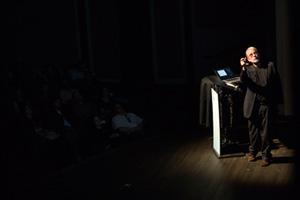 As useful as Murch’s book In the Blink of an Eye is as a layman’s guide to the arcane craft of film editing, it does little to reveal the roiling polymath behind it. In short, I think Murch is someone who must be seen or heard to be believed.
As useful as Murch’s book In the Blink of an Eye is as a layman’s guide to the arcane craft of film editing, it does little to reveal the roiling polymath behind it. In short, I think Murch is someone who must be seen or heard to be believed.
Murch’s manner and methods serve to remind us that order is imposed in the form of ideology. The rest is mechanics, be it a policeman or a panel. A bona fide leader, Murch offers a new generation of filmmakers something that this fledgling panel movement does not: a perspective on the past which informs the present and does not presume to speculate about the future. Somehow, too, he remains a visionary, risking “the introduction of a new species into an ecosystem” by being the first to bring consumer editing software to a big-budget studio production. His affinity with film history fuels a progressive attitude which has more practical impact than a thousand voices earnestly asking “What’s Next?” Without being so explicit, he assures us that we see nothing when looking forward. Looking backward, however, we see everything. And it’s an exhilarating view.
A technology sometimes arrives before the culture in question can support it. Maybe the personal cinema camera, like the Aztecs’ aborted wheel, will fall into desuetude because we had no idea what to do with it the first time around. We have not used it to make films, after all. We have used it to make panels. We have used it to make superfluous words instead of indelible images.
Next time I hope we deserve it.
— Alejandro Adams








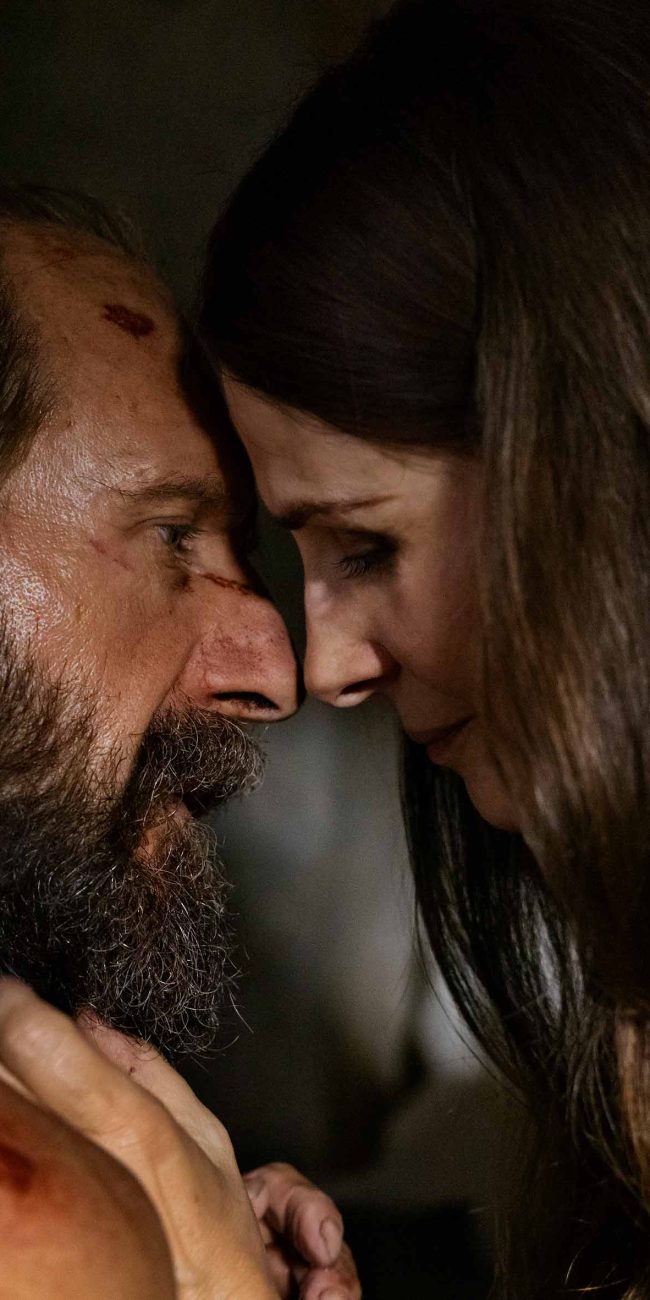
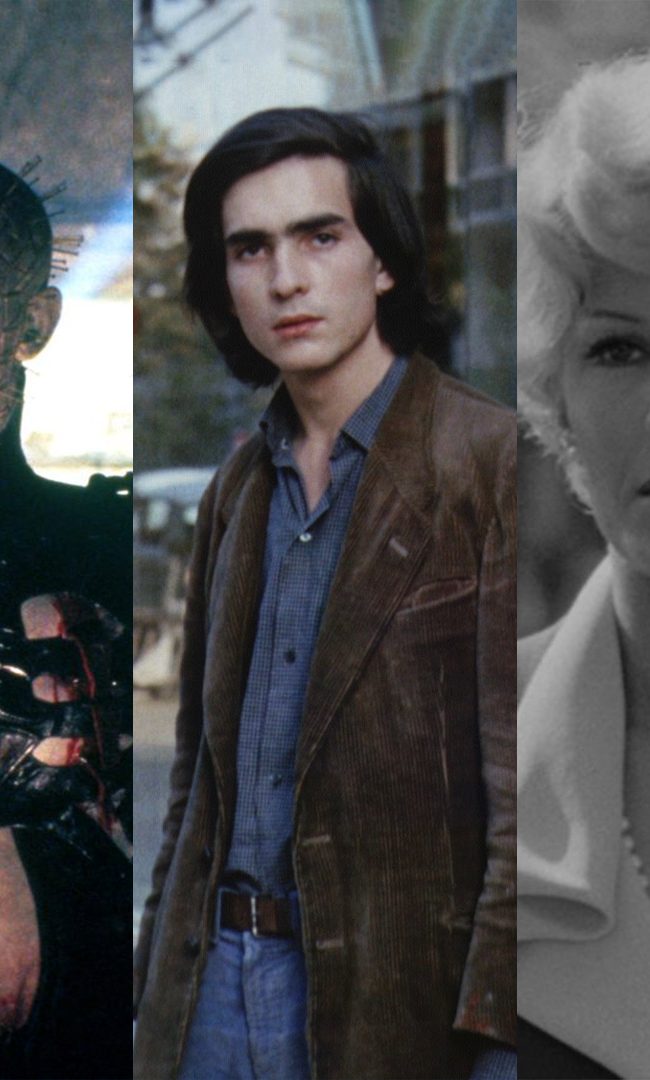


Pingback: Hammer to Nail » Blog Archive » Thanks For Waiting… We’re Back!
Chad Hartigan
Super great article.
Amir Motlagh
As reluctant as I am to leave public comments nowadays, the tone and authority of this piece begets a type of self-retraction. First, having had the privilege to be in the presence of Walter Murch once, I knew that I had learned something invaluable, something which was about as equal as 3 years chasing an MFA. I don’t say that lightly, nor am I dismissing formalistic education, just that, in the end, learning is about nuggets of information mixed with application. So, although it would be hard to numerate those experiences, they are similar in outcome. I can say the same about having a conversation with Uta Hagen.
Second, the way this piece ends is the most interesting aspect. In that, while the birth of DV was in many ways an idealist drive towards fulfilling Jean Cocteau film/art quote to some, the reality is that the culture itself had no way of knowing what to do with it. Instead, the rush to commercialize something that is devoid of those instincts played on the desperation of filmmakers whom equate sales or recognition as the ultimate end game. Its a dualism that rests secretly in the heart of most whom make art, even the most underground. But, whereas in other art cultures whose community might champion non commercial pursuits as both a noble and vital cause, in film, you take on the role as a nobody. And a nobody is usually a somebody you can make money off of.
Pingback: THE RUMBLE IN THE RUBBLE: A REPORT FROM SFIFF 2011 – PART 2 – Hammer to Nail